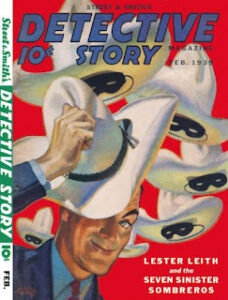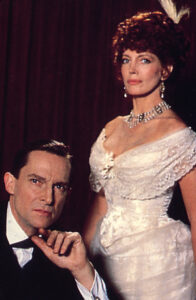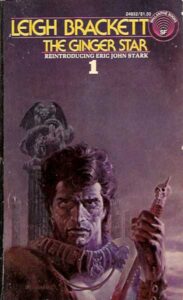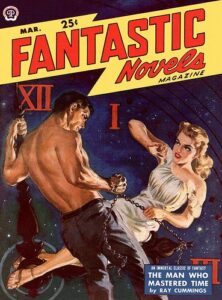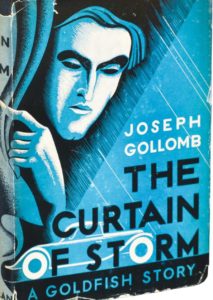Our cultures are made of stories. Our ideas of the world and the way we interact with it are influenced by what we see in our entertainments. It’s interesting to note that many of the ideas and characters that are important to our current popular culture came from the fertile world of pulp fiction. We need to recognize the creators of those ideas and characters to honor their work, and to motivate new creators to make their contributions. There is one such pulp author who contributed greatly to 20th Century popular fiction who rarely gets the recognition she deserves.
Leigh Brackett (1915-1978) was an important Pulp writer who had a long career in popular fiction that began in the early science fiction pulps and continued to mainstream movies and television shows. Despite her stylistic excellence and continuing influence on popular culture she has only achieved moderate recognition as an author. An Internet search of Brackett’s name will bring up her IMBD page, and a few scattered postings about her and her work from bloggers who recognize that she deserved a higher profile.
If you examine popular fiction from the 1940s on, especially the genre of Science Fiction, you see Brackett’s imprint, voice, and contribution in key works of creation time and again. From pulp magazines to teleplays for mid-20th Century television to screenplays for classic film noir and seminal Science Fiction movies, Brackett was an important and prolific contributor to mainstream and genre fiction.
Leigh Brackett was a popular writer for the pulps, particularly Planet Stories Magazine, creating stories where her tough male protagonists and dangerous female characters adventured in. She was so prolific and popular that she became known as the Queen of Planetary Romance, the term “romance” here being used in the older sense of a “fantastic story”.
Her stories often featured some strange technology that set the scene for her very human characters to come into conflict. It was common at the time for science fiction to set their stories in a fantasy version of the Milky Way galaxy. Taking their cue from Burroughs and other popular authors writers set their stories in recognizable but greatly changed nearby planets. Mars was a desert planet of ancient civilizations fallen into decay; Venus was humid place of strange jungles. While the exotic alien landscapes and the bizarre tech provided the situation, it was the dark passions and internal drives of the protagonists that were at the center of the Brackett’s stories.
While working within the conventions of the hard-boiled or science fiction pulps, Brackett brought something unique to both genres. Her stories set in the far future or distant planets were written with the bracingly clean, sardonic style found in the best hard-boiled crime fiction. This brought a philosophical and emotional complexity to the characters that was unusual in pulp fiction of any type.
Brackett was a master of that clear and sardonic style of prose made popular by writers of hardboiled crime fiction. Her prose was as tight, bleak and hard hitting as any by Hammett or Chandler but had a lyrical sensuality that was all her own. She was able to bring a hardboiled sensibility to science fiction, creating alien worlds and characters that were mind-bendingly bizarre but still recognizably real and darkly cynical.
Here is an excerpt from a story featuring her series character Eric John Stark, an adventurer raised by nonhuman animals on Mercury. In this scene Stark is being pursued across the Martian desert, but his flight has come to an end.
He knew who these men were and what they wanted. They were officers of the Earth Police Control, bringing a gift — twenty years in the Luna cell-blocks. Twenty years buried in the grey catacombs, buried in the silence and the eternal dark.
He recognized the inevitable. He was used to inevitables – hunger, pain the emptiness of dreams. He had accepted a lot of them in his time. Yet he made no move to surrender. He looked at the desert and the night sky, and his eyes blazed, the desperate, strangely beautiful eyes of a creature very close to the roots of life, something less and more than man. His hands found a shard of rock and broke it.
Queen of the Martian Catacombs originally published in Planet Stories Magazine (1949)
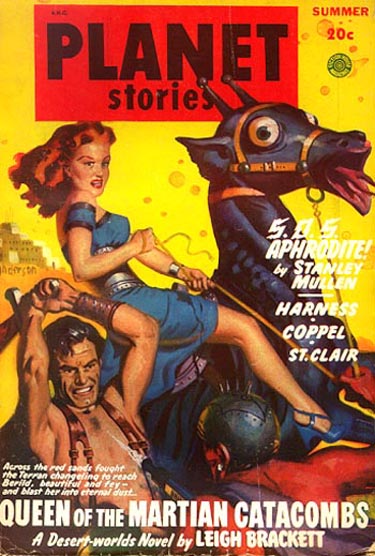
Readers responded, finding much in her characters and tone of her writing to admire and appreciate. Her mastery of atmosphere and dialogue brought her the respect of other writers, including a young Ray Bradbury who considered Brackett one of his mentors. Bradbury eventually collaborated with her on the story Lorelei of the Red Mist.
She was married to science fiction pulpster and comic book writer, Edmond Hamilton, he of the Captain Future stories, among others. He and Brackett and other authors established the Planetary Romance genre as an important movement in early to mid-20th Century science fiction. They collaborated on the story Stark and the Star Kings, published in 2005, featuring Brackett’s character Eric John Stark set in the Star King universe from Hamilton’s stories.
Her popularity with readers, and her ability to work across genres allowed her to develop another more lucrative career writing for movies and television, alongside prose writing. Motion picture director Howard Hawks was so impressed with the dialogue in her crime novel No Good From a Corpse (1944), that he hired her as a screenwriter for a productive collaboration that lasted years and many movies.
Brackett worked with William Faulkner to write the Howard Hawk’s movie adaption of Raymond Chandler’s The Big Sleep (1946), that starred Humphrey Bogart. It was arguably Bogart’s performances in this movie, and the earlier The Maltese Falcon (1941), that served as the main example in the public’s mind of the bantering, hard-boiled, but honorable detective which was so important in pulp fiction.
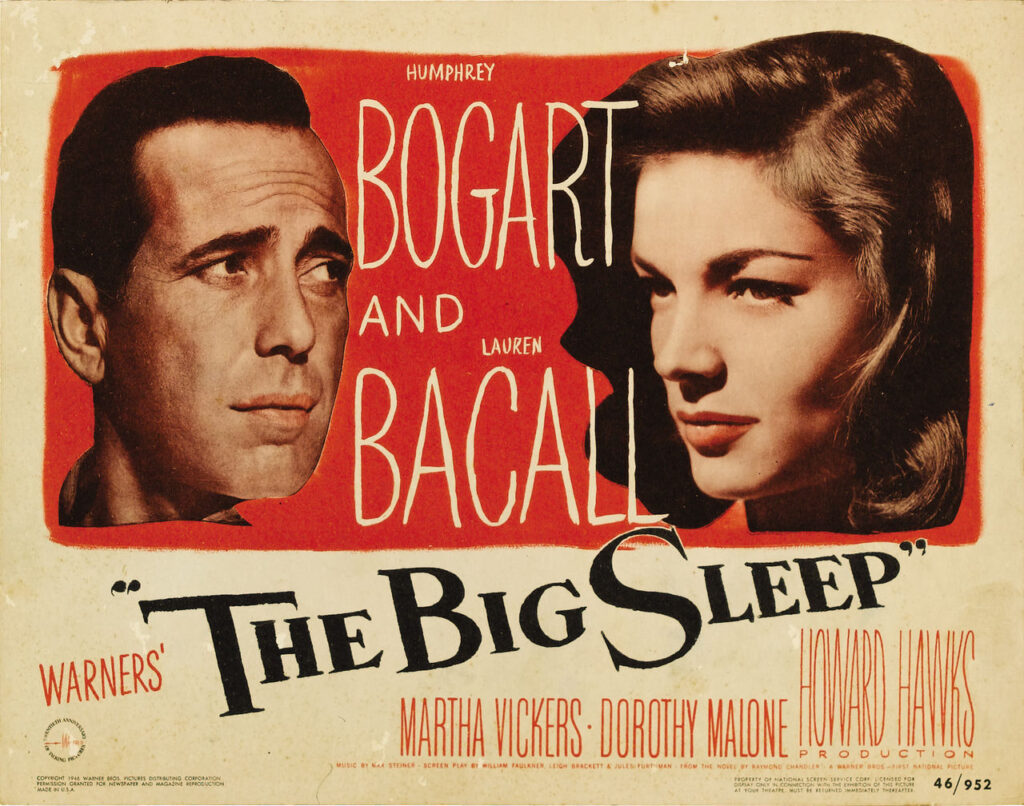
After this success, Brackett continued to write for Howard Hawks, most notably on the John Wayne vehicles, Hatari! (1962) and El Dorado (1966). Bringing her talent for writing tough heroes adventuring in exotic locations. The story is that Hawks was so impressed with the hard-boiled dialogue in Brackett’s crime novel No Good from a Corpse (1944) that he sent for her believing she was a man because of her tough, clean prose style.
She wrote the screenplay for the movie adaption of Chandler’s novel, The Long Goodbye (1973), directed by Robert Altman and starring Elliot Gould.
She wrote an early draft the screenplay for the second Star Wars movie, The Empire Strikes Back (1980), shortly before her death in 1978. It is uncertain how much of her efforts were carried through to the final script since other writers worked on subsequent drafts. However, it is noteworthy that George Lucas recognized Brackett’s abilities and experience as screenwriter, and possibly as a talented author of science fiction to bring her in on what is arguably one of the most important and influential science fiction projects of the 20th and 21st Centuries.
Along with her career in writing screenplays, she wrote scripts for popular television shows like The Alfred Hitchcock Hour (1963) and The Rockford Files (1975), and she continued to write science fiction such as the novels The Long Tomorrow (1955) and The Sword of Rhiannon (1953).
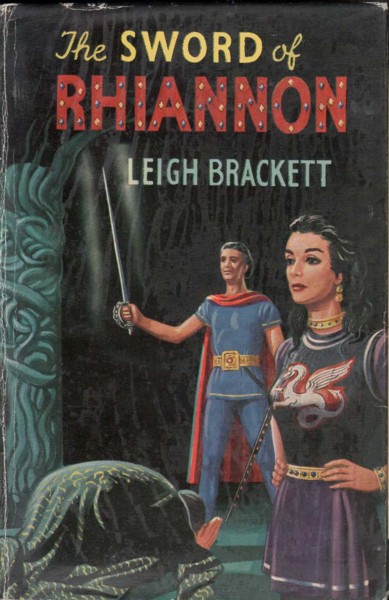
By any measure Leigh Brackett produced an extraordinary body of work, all achieved with her dedication to creating enjoyable fiction of the highest technical quality, and stamped with a voice and style all her own. She created or collaborated in some of the most influential works in the hard-boiled and science fiction genres, in print and on movie and television screens. While not as well-known as some of the authors she influenced and mentored, Leigh Brackett’s work was an important contribution to popular fiction as we know it.

